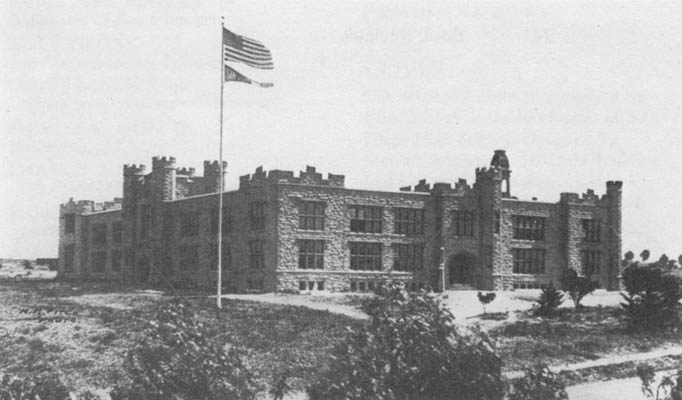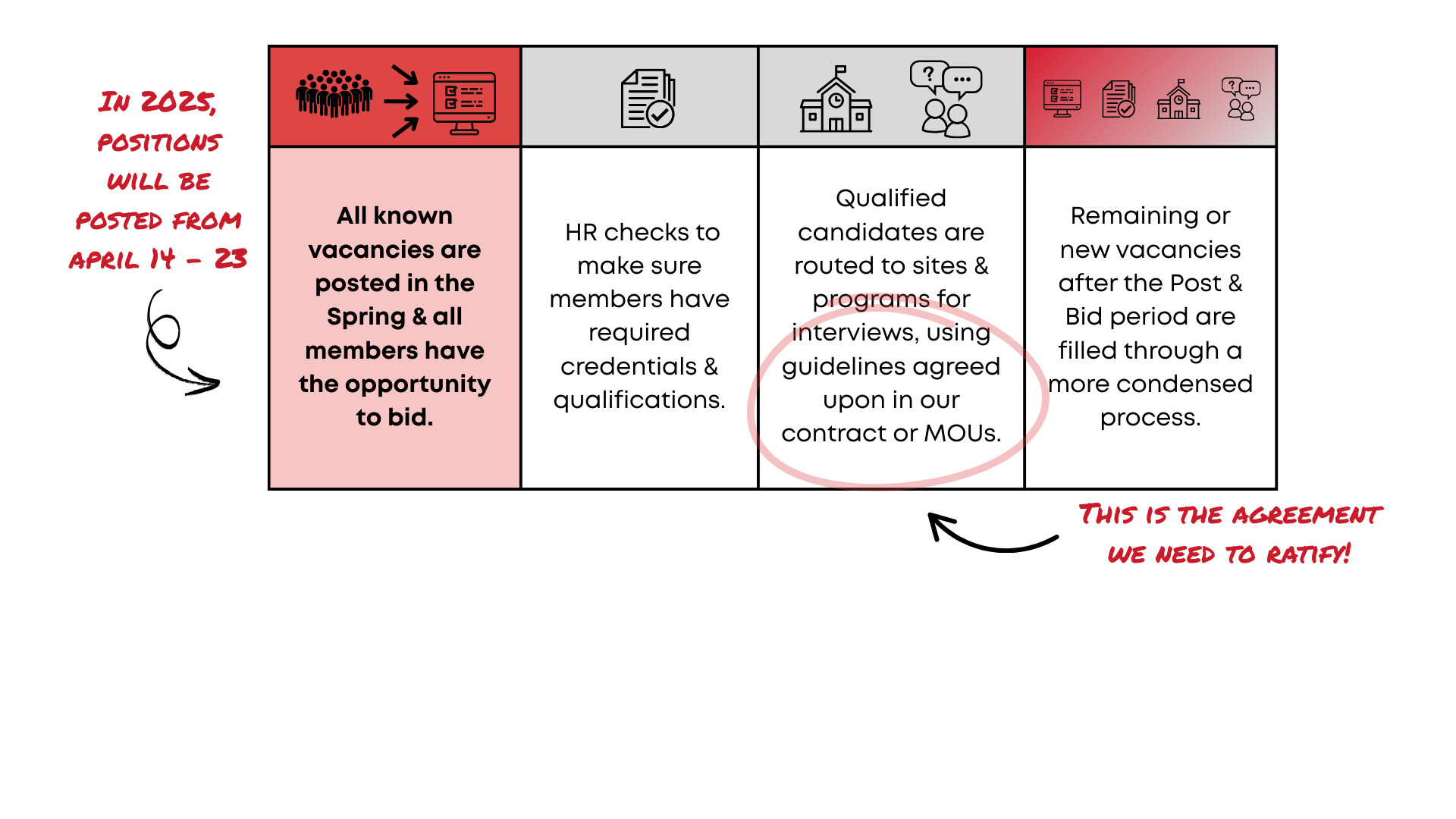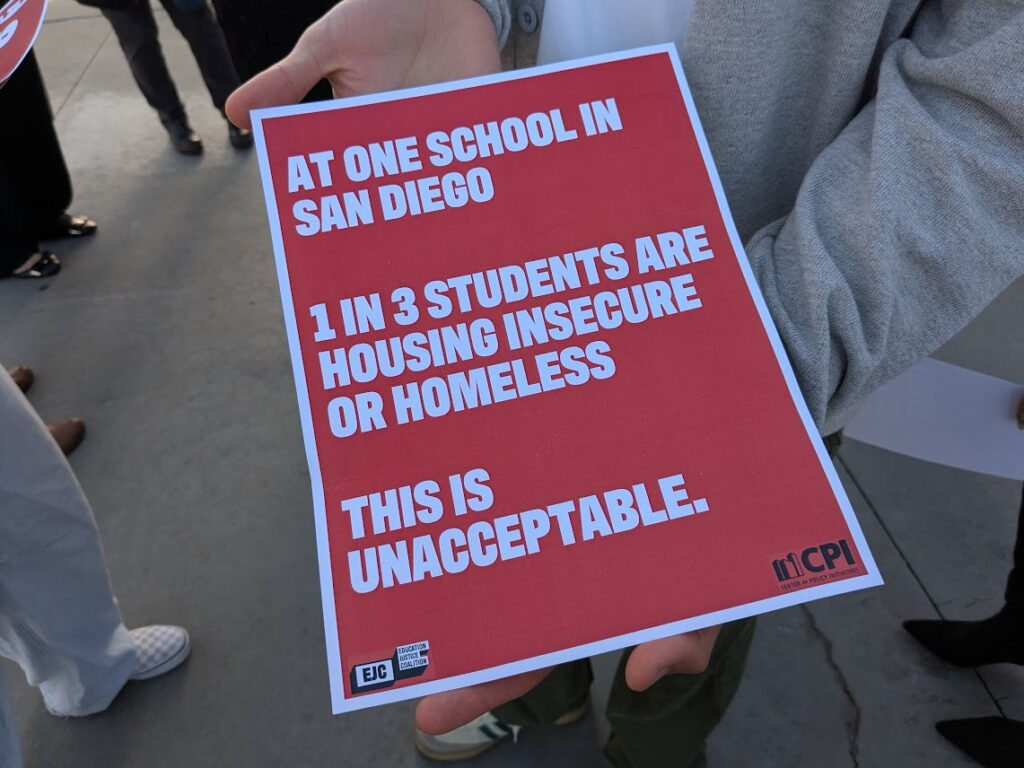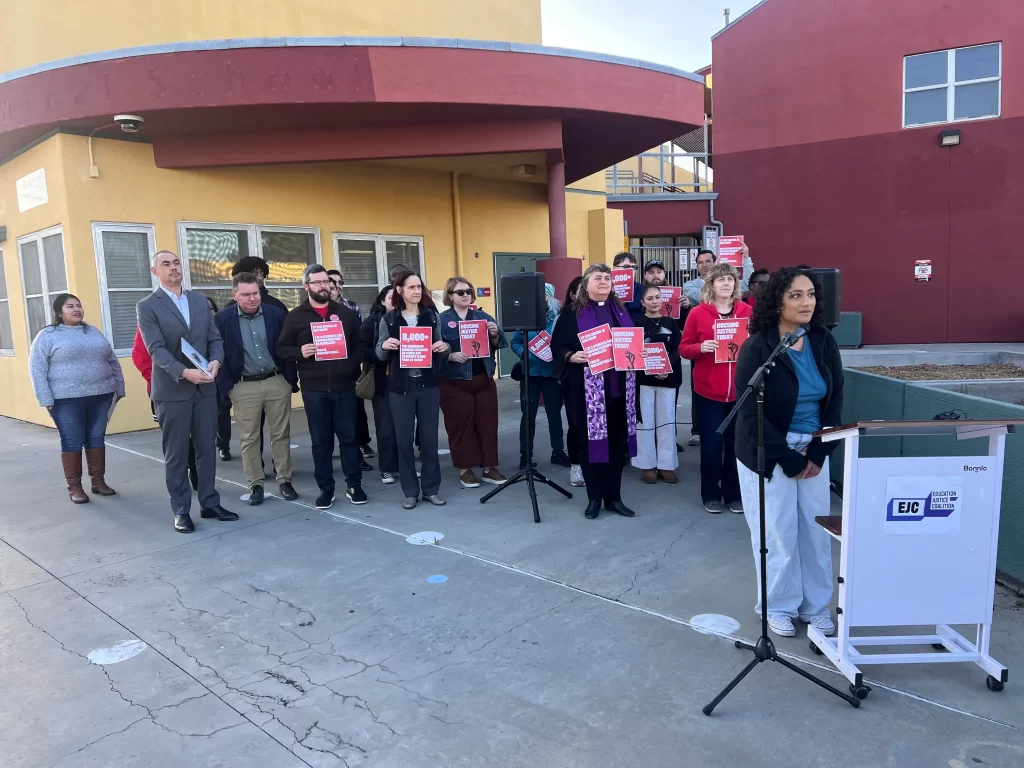Letters in Solidarity: Fight for Our Schools on May 17
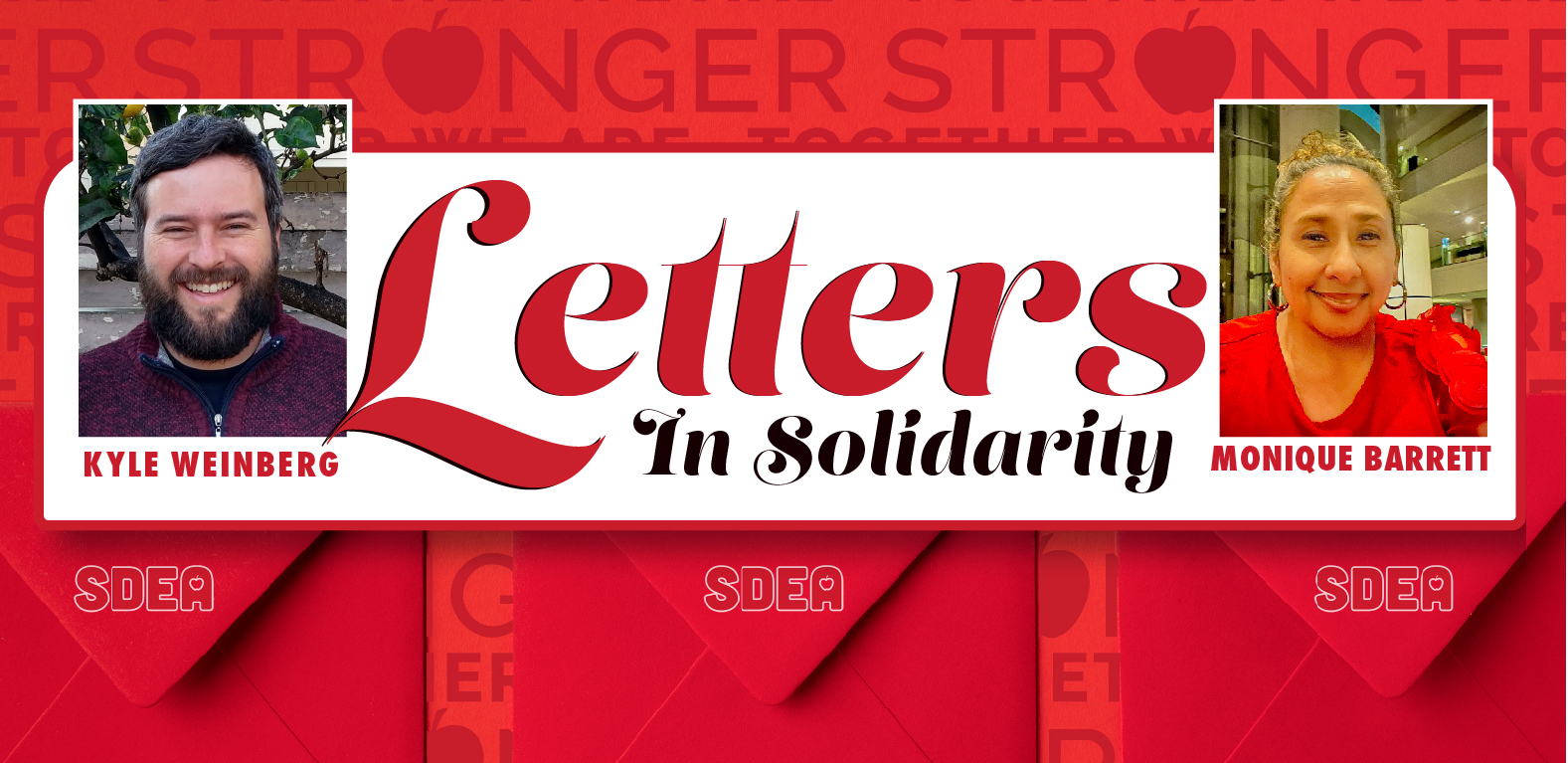
Fight for Our Schools on May 17
We hope that everyone returned from spring break rested and recharged as we head into the final stretch of this school year. These have been challenging months for all of us as we continue to absorb the impact of the threats from the federal administration to target our most vulnerable students and communities. The illegal directives from the US Department of Education to end equitable practices in our schools have generated fear and uncertainty and it has been tough to stand strong as union educators with the constant attacks on public education.
Alone as school communities feeling the weight of defending ourselves from those who seek to weaken us, we can feel isolated and powerless. What gives us hope is our history as unions, allied with community organizations, in successfully pushing back on attempts to dismantle public education and rollback the gains of the civil rights era to combat systemic inequities. Today, this movement for education justice is manifested in our statewide We Can’t Wait contract campaign for fully staffed, stable and inclusive schools that we are taking on with 31 other unions and nearly 80,000 union educators throughout the state.
In line with our We Can’t Wait contract platform, our SDEA bargaining team proposed a package of solutions on March 27 to address our district’s special education staffing crisis like monthly case management days and a pathway for educators to be reimbursed for obtaining a Special Education credential. Our students with disabilities struggle to overcome obstacles when the district can’t fill vacancies for special education teachers who tailor instruction to their individual needs. Unfilled positions increase the workload for the rest of the educators in a school, impairing our ability to get all students in our classrooms the support they deserve. Cuts to special education funding from the federal government would add to the instability for our highest need students.
We won't stand by while the Trump/Musk administration seeks to undermine public schools. Education is a non-partisan issue. Students in poverty and students with special needs deserve resources and support in our schools – we can all agree on that. The Trump/Musk administration is targeting students and families in our communities with vicious plans to dismantle public education. It’s unacceptable and we’re fighting back.
On May 17, we’ll be mobilizing in San Diego and joining union educators and allies across the state to demand that Congress protect funding for our schools and our students’ civil rights. Join us!

SDEA History Corner: The Solid Three
by Gail Boyle, President of SDEA-Retired
Picture 1917 San Diego. Balboa Park had just been created for the Panama-California Exposition 1915-1917, transportation was by street car and horse and buggy. Women dressed in long skirts. Men wore hats. Streets weren’t paved. San Diego City Schools had 1 High School (San Diego High) and 13 elementary schools. There were no junior highs.
The old San Diego High School - the “Gray Castle”
More than 100 years have gone by since the inception of SDTA (later SDEA). Prior to the Spring of 1917, there was no teacher organization in San Diego. By the beginning of the second semester of 1918-19, the San Diego Teachers Association was a functioning organization with a membership of 90% of the teaching personnel. Something must have happened. Something had.
The story begins in April 1917 with the election of three new members to the Board of Education. During the campaign for school board, these three candidates, known as “the solid three” had a list of changes they wanted to make – some limiting academic freedom and getting rid of Superintendent McKinnon, who teachers generally approved of. At the time teachers were more timid about political action than now.
If there were any doubts about the designs of the “solid three” those doubts were dispelled when, on Thursday morning, May 24, each teacher received at his/her respective school a questionnaire from the Board of Education. The following are some excerpts:
- Do you wish to remain in your present position at the city schools?
- The vote of the people seems to indicate that certain changes in the schools are necessary. Do you feel that you can work in harmony with the new management and give them the loyal support necessary for success…? If not, state your reasons.
- Kindly enclose your reply in self-addressed envelope and mail within three days.
What would your response be, remembering that there was no contract, no advocate organization and no due process rights? Question 1 seems innocuous enough. However, considering question 2, it is apparent that it implies a penalty awaiting any teacher who should fail to answer the questions with proper servility.
The letter was received by the teachers with consternation and fear. Many teachers could accede to the request of the questionnaire only by surrendering their professional ideals. On the other hand, they were under no illusion as to the probable consequences if they failed to respond.
Three teachers at San Diego High School weren’t about to return the questionnaire, but realized that as individuals they would not be able to protect themselves, so they held a meeting at the University Club and invited all teachers at San Diego High to come to make a decision about responding to the Board. Their proposal was to send a group response to the Board, rather than individual.
San Diego High teachers met and of the 94 teachers, 91 came to the meeting. They voted 76 for the group response instead of individual responses, 5 against, 10 abstentions. Those who signed knew there might be consequences. Their letter stated they were sending a collective response, that they could not respond to question 2 without knowing what “certain changes” meant, that they wanted individual contracts abolished and that there should be tenure like others in governmental service, conforming to civil services regulations. Needless to say, there was much turmoil. The Board had never seen collective demands from teachers. The issue of tenure was particularly distressing to the Board of Education.
CTA was at the forefront of the battle for tenure for the next 20 years. Today we are used to teachers having rights along with responsibilities, but those rights were not present at the beginning.
This action was not without consequences… learn more in our next History Corner!
SDEA Scholarships Process
Did you know that there are college scholarships available for SDEA members and their dependents?
Every year, our union proudly offers scholarships to support the educational goals of members and their families. There are specific applications for high school students beginning college or continuing college dependents of SDEA members, and for SDEA members pursuing education to enhance their career as educators. This year’s deadline for submission is Friday, May 2, 2025, at 5 p.m. PST.
Get the full details and access the application forms here!
Who decides who gets a scholarship?
Each year, the SDEA Scholarship Committee (a group of members appointed by the SDEA Board) takes on the important task of reviewing applications. Lisa Steinberg, the SDEA staff liaison, receives all submissions and preps them for review before handing them over to the Scholarship Committee:
- All identifying information is removed to keep the process fair and anonymous.
- Reviewers are carefully assigned to avoid conflicts of interest. Committee members never score applications from their own school cluster, to avoid reviewing applications from their students or colleagues.
- Every application is reviewed by at least two committee members using a consistent scoring rubric.The full committee then meets to review scores and determine scholarship recipients.
On average, 8 to 10 scholarships are awarded each year out of 40–50 applications received.
If you're an SDEA member and interested in serving on the committee, reach out to Lisa Steinberg. Your union is always stronger when YOU are involved!
How are SDEA scholarships funded?
SDEA scholarships exist through member contributions.
Much like contributions to our union’s PAC fund, scholarship donations are voluntary and separate from regular union dues. These scholarship fund contributions are one small way that our union solidarity can make higher education more accessible, in a system where the high cost of college makes it inaccessible to many.
Are you already contributing to the SDEA scholarship fund? You can make a difference by authorizing a monthly donation online via DocuSign, or by downloading a printable form here. Member generosity helps students and educators pursue their dreams, and builds our collective solidarity!
Know Your Rights & Know Your Vote: 2025 Post & Bid
We need to ratify an agreement to continue phasing out Fall "Excessing"!
- Read the full agreement: Ongoing Implementation of 2025 – 2026 and 2026 – 2027 Pilot Minimizing Fall Transfers
- Know Your Vote (An overview of what a Yes or No vote will mean)
- Know Your Rights: Post & Bid 101 (An overview of the process)
Context: A More Stable Transfer Process
Each year, school staffing shifts based on student enrollment, which determines funding. While our union contract includes protections during these changes, Fall Involuntary Transfers (“Excessing”) has remained especially disruptive: educators are forced to pack up classrooms they just set up and leave the students and families they just met, all due to enrollment estimates from the prior year that did not materialize in the Fall.
To address this, SDEA members negotiated an agreement with the District in May 2024, launching a new transfer process that prioritizes stability by piloting a new version of Article 12: Transfer Policies. A joint Transfer Monitoring Committee (TMC) including both District staff and SDEA members has been actively overseeing the pilot by monitoring real-time enrollment data & recommending improvements to processes with the end goal of phasing out Fall excessing.
Now, Members Need to Vote!
The pilot agreement expires June 30, 2025, and only addressed the transfer process for the 2024 - 2025 school year. The SDEA bargaining team recently began negotiating permanent improvements to the transfer process for our next contract, but we do not have an agreement yet with the district on Article 12. To keep existing improvements and continue phasing out Fall “Excessing,” SDEA members must vote to ratify this agreement.
Stay tuned for an email from SimplyVoting with a link to vote, and use the resources on this page to understand what you are voting for.
Budget Input Sessions
The SDEA Bylaws give members the opportunity to provide feedback on the SDEA Budget. There are two virtual budget input sessions scheduled to give input for the 2025-26 Budget. To attend, RSVP using the links below:
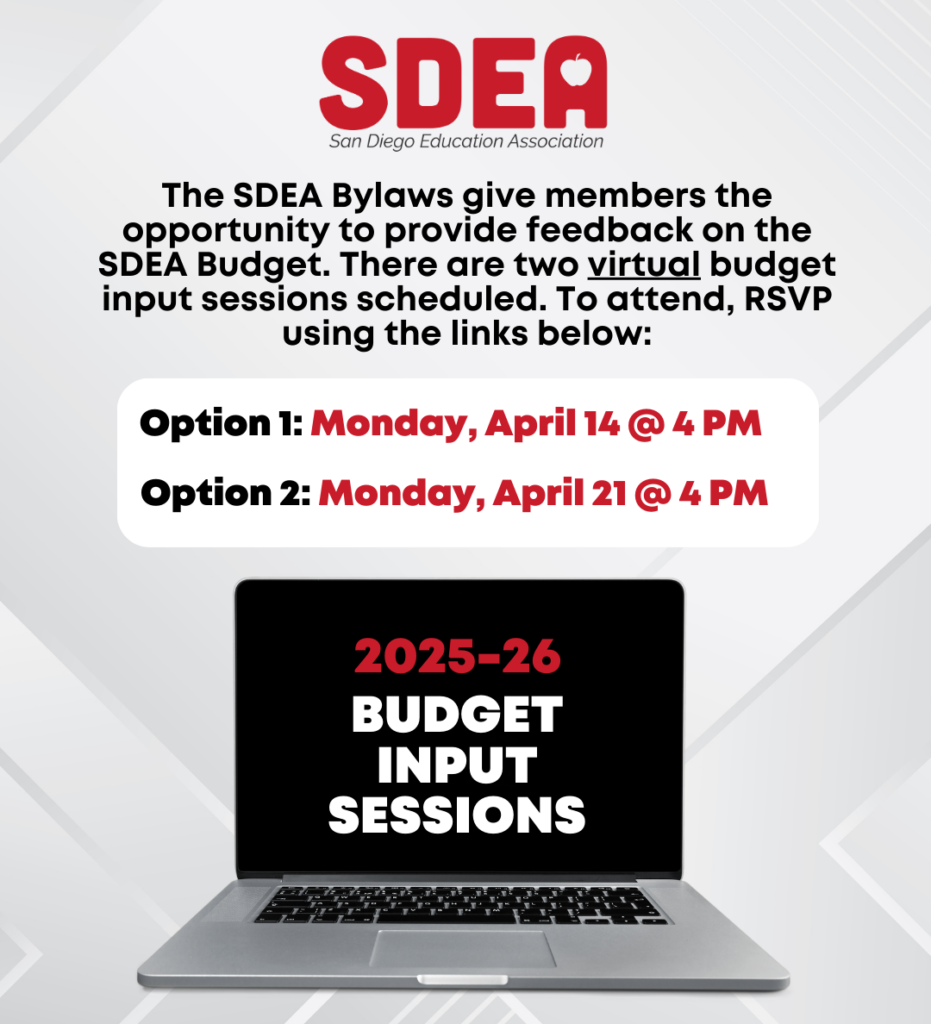
The Standard: Switch Through April 30
SDEA members, are you already enrolled in The Standard? Your opportunity to switch to The Standard for your CTA-endorsed Disability is now available! Apply now with no health questions asked!
Bargaining Update - March 27, 2025

With an executive order threatening to dismantle the Department of Education, the fight for public education funding has never been more urgent. Any Federal cuts will hit programs like Special Education the hardest, where educators are already stretched beyond capacity. Now more than ever, we must secure a strong local contract and robust state funding to protect our schools and ensure students and educators receive the resources they need.
In our second bargaining session, SDEA members on the Bargaining Team focused on staffing and additional proposals ensuring stability for our schools and communities. Read more about our proposals below.

Our proposals from this session address critical staffing shortages while strengthening contractual protections to prevent overloading educators. Our students deserve more than the bare minimum! We need staffing that allows students and educators to thrive, not just survive.
Special Education Staffing:
The shortage of Special Education staff is a crisis impacting our whole community. SDEA members are still waiting on a fair grievance settlement for caseload violations in previous school years, but delayed annual settlements don’t solve the root issue of ongoing vacancies in Special Education that lead to unsustainable workloads and students not getting the support they need. Our proposed changes to Article 29: Special Education aim for more concrete solutions:
- Addressing the District’s inability to staff Special Education with a monthly stipend for educators over caseload, to ensure timely compensation.
- A monthly Case Management Day for Ed Specialists and protected time to complete necessary paperwork and communications.
- A pathway for educators to add a Special Education credential paid for by the District, to help fill vacancies (building off the initial agreement to offset retirements in this year’s Supplemental Early Retirement Program.)
- Increased allocation of School Psychologists, improved caseloads for Speech Language Pathologists, and caseload and IEP caps for Early Childhood Special Education classes to support our highest need students.
Transitional Kindergarten Staffing:
Many of the proposed changes regarding TK come from language agreed upon in 2021 with the establishment of TK classrooms staffed with Multiple Subject and Early Childhood Education co-teachers. The District has already announced that TK class sizes will be reduced from 24 to 20 students in the 2025-26 school year, which aligns with new state law. Our proposed contractual changes ensure that the District maintains the co-teaching model and appropriately staffs schools to support our youngest students during the entire school day. See all proposed changes in Article 8: Hours of Employment and Article 13: Class Size.
Additional staffing proposals:
- Protect educator prep time and prioritize shared decision-making to make sure educators have a voice in the decisions that impact their work. See all proposed changes to Article 8: Hours of Employment and the related Appendix H: Part-Time Certificated Assignments.
- Increase elementary prep and enrichment allocation in Appendix M.
- Limit combo classes and a new school-based Mental Health Counselor position to address growing student social-emotional and behavioral needs and ensure a full-time nurse at specialized schools. See all proposed changes to Article 13: Class Size.
- Expand job-sharing opportunities to retain educators in our district even when they cannot work full time. See all proposed changes to Article 21: Job Sharing.
- Prioritize staffing Summer School & Intersession by seniority, and ensure educators can use any available sick leave during summer school. See all changes to Article 17: Summer School/Intersession Hours & Conditions of Employment.
To expand on the proposals already submitted in February, we proposed changes to two additional articles which would ensure stability for our students and communities:
- Finally end the unnecessary chaos of Fall Transfers (or “Excessing”) using findings from the joint committee which has been working to minimize the disruption of Fall excessing. See all proposed changes to Article 12: Transfer Policies.
- Ensure community voices are centered in our Community Schools by empowering Community School Site Governance Teams and expanding culturally-sustaining and community-based curriculum. See all proposed changes to Article 36: Community Schools.
It’s time to pay educators!
At our first bargaining session, we proposed a combined 10% salary increase by 2026 including a retroactive 2% raise for the current school year that would help cushion the blow of San Diego experiencing the highest cost of living increase in the country. According to the District’s 2nd Interim Budget presentation, the District is projected to end the current fiscal year with at least $75 million in addition to the 2% required minimum reserve. It is clear that the District can afford an educator salary increase that will alleviate the growing staffing crisis and keep the highest quality educators in our schools. Now is the Time for district leadership to settle the raise for this year and get our students the support that they deserve!
Make sure the District knows: We Can’t Wait!
With the majority of our proposals on the table, it’s time to turn up the pressure. Rolling pickets at schools across the city starting Monday, April 28 will show the District that we mean business as they consider how to respond to our demands. The more members, families and community allies that show up, the stronger our message: It’s time for the District to prioritize resources for our schools and for our students! We Can’t Wait! Make sure to attend your next union meeting to stay informed, stay engaged, and get ready to take action together!
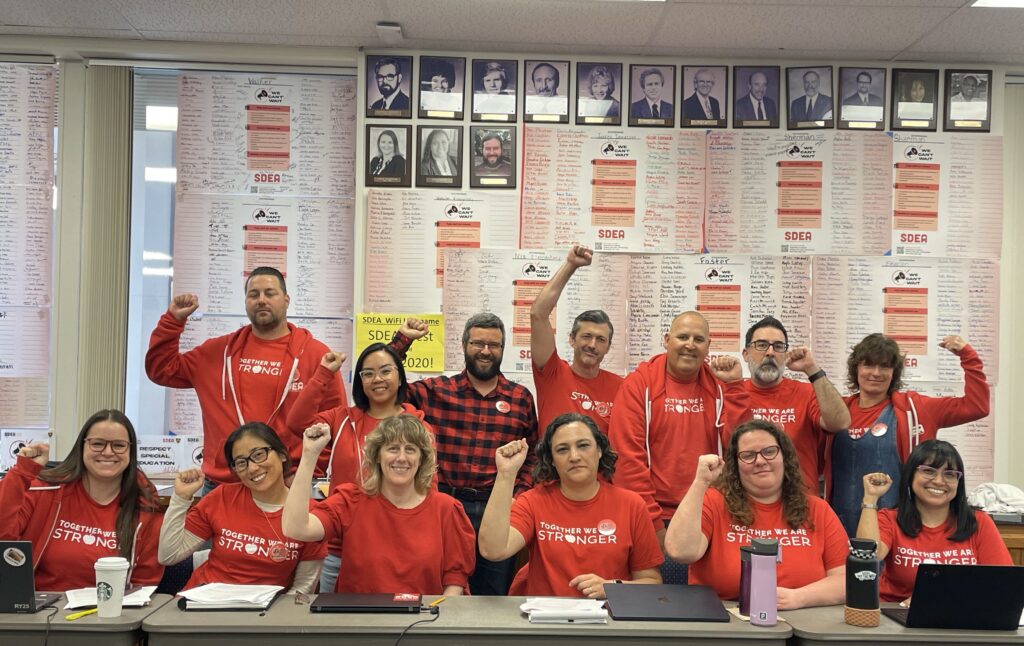
During bargaining, the walls were covered with petitions signed last month, to remind the District of the people power beyond the faces they see at the bargaining table.
Stay Informed:
Our next bargaining session is scheduled for April 24, 2025. See an updated list of all articles we will be negotiating this year and our bargaining proposal tracker to keep track of ongoing negotiations.
In Solidarity,
SDEA’s Bargaining Team
Kyle Weinberg, SDEA President, Laurie Bailon, Restorative Justice Teacher, Bell MS; Carly Bresee, Ed. Specialist: Moderate/Severe, Perkins K-8, Sarah Darr, SDEA Secretary, WCW Campaign Organizer & Senior SLP; Christina Gallegos, ECSE Teacher, Rodriguez ES; Candace Gyure, School Nurse; Stacy Hernandez, SDEA Bargaining Chair & 2nd Grade Teacher, Dailard El.; Andrew Melia, School Psychologist, Riley School; Elizabeth Miller, Ed. Specialist: Mild/Moderate, Lewis MS; Eri Nall, Head Counselor; Kiki Ochoa, History and Ethnic Studies Lead Teacher, Lincoln HS; Lori Schmersal, PE Teacher & Coach, Clairemont HS; plus SDEA staff Anthony Saavedra, Executive Director, and Sara Holerud, Organizer

Mar 18 Press Conference: Safe Parking Site
This past Tuesday, SDEA members joined the Education Justice Coalition at a press conference at the old Central Elementary site—offered to the City of San Diego as a safe parking site under an agreement between SDEA and the District, which included broader housing supports for educators and students. However, the site was never opened, prompting educators, District leadership, and community partners to call on the mayor to follow through. With over 8,000 San Diego Unified students experiencing homelessness or housing insecurity and limited shelter beds available, establishing a safe parking lot for families living in their cars is the bare minimum.
See news coverage:
SDEA endorsement: Paloma Aguirre for County Supervisor
At the March Rep Council, SDEA representatives voted unanimously to endorse Paloma Aguirre for County Supervisor. Paloma is a supporter of public education and public educators who is running for the vacant seat in the County’s First Supervisorial District. A Special Election will be held April 8, 2025. Voters in District 1 should have gotten ballots mailed to them the week of March 10.
- See more election information here
- See more about Paloma and her campaign: Paloma-Aguirre.com
- See more information about the democratic process that SDEA members use to endorse candidates and decide union policies
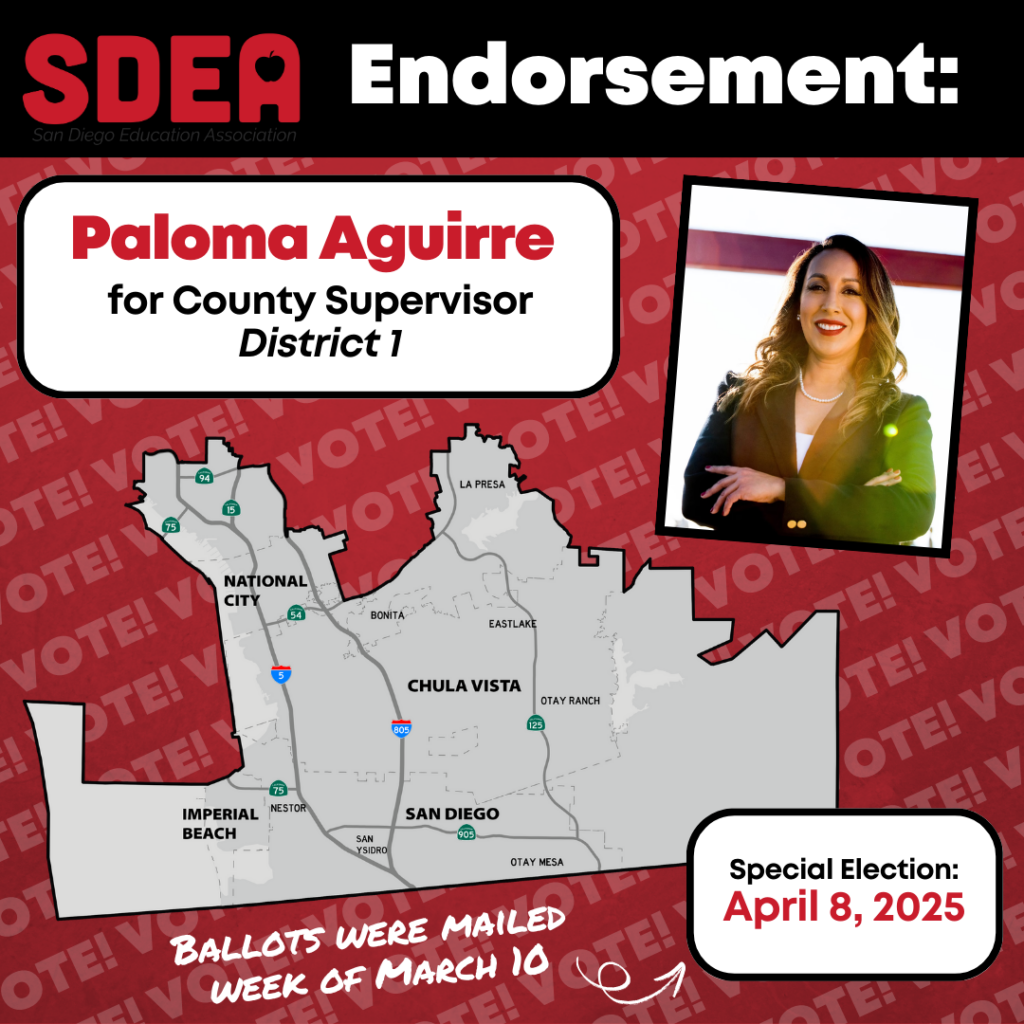
Join labor allies to help get Paloma elected!
1 in 4 voters in Supervisor District 1 are union members! The San Diego and Imperial County Labor Council is hosting walks to get out the vote for Paloma and get a labor-friendly candidate in this important seat:
- RSVP HERE for Saturday March 22!
- RSVP HERE for Saturday March 29!
- RSVP HERE for Saturday March 29!
- RSVP HERE for Saturday April 5!
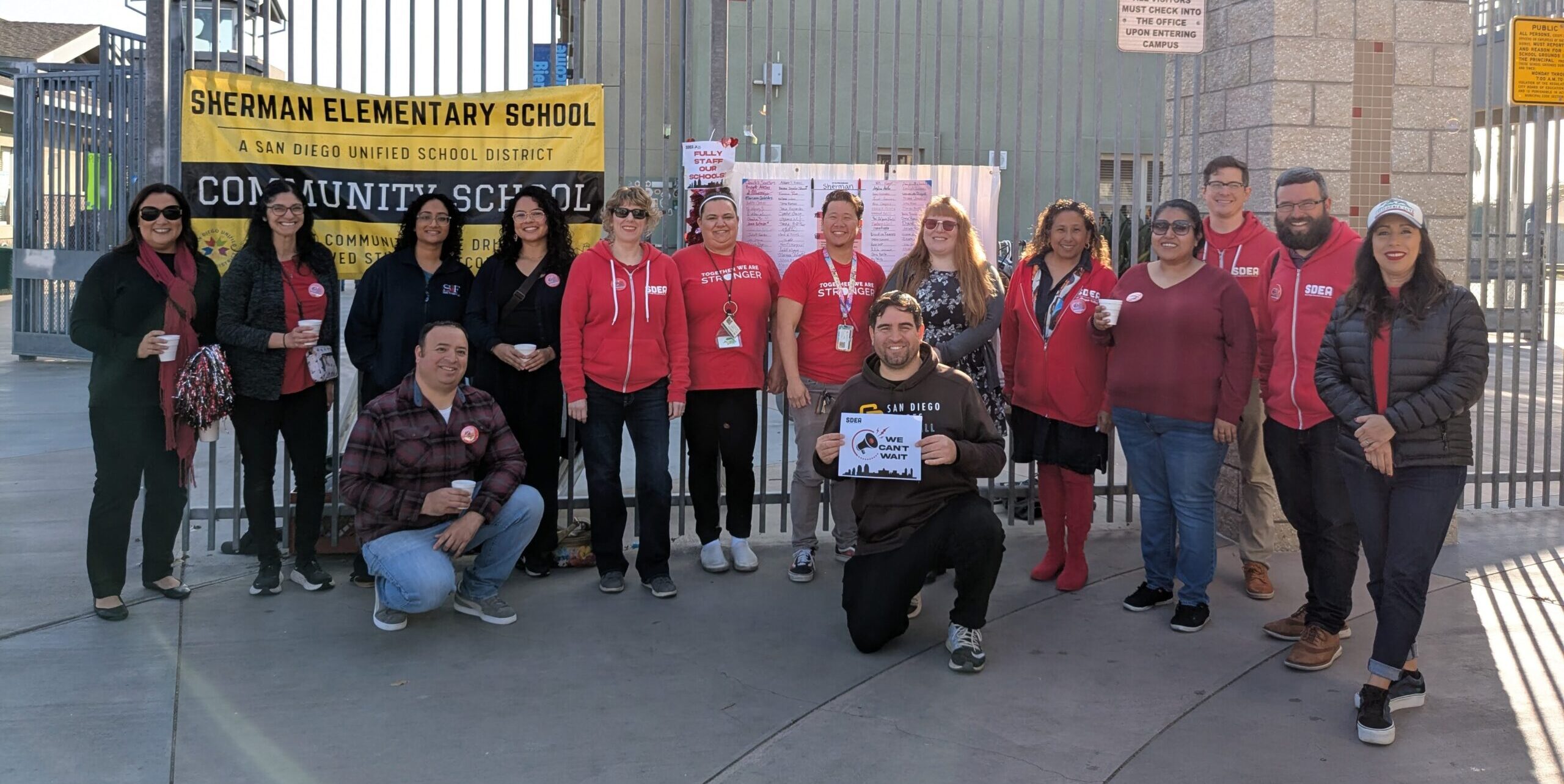
Paloma recently attended a walk-in and rally at Sherman Elementary, to hear from SDEA educators, families, and community partners from the Education Justice Coalition.
Update: Ed Specialist caseload grievance
Still waiting for a fair settlement: An update to the Ed Specialist caseload grievance
SDEA members who were over caseload during the 2023-24 school year and those currently over caseload are still waiting on a fair grievance settlement. The District’s most recent offer still underpays many members compared to past years.
The District is still proposing flat stipends for ranges of overages rather than a per-student, per-week amount. Their data is not reliable enough to report exact overages across the school year accurately, so ranges (caseloads of 21-23, 26-27, etc) would allow members to be paid more efficiently without extensive paperwork to correct even small errors in how many students were actually on their caseload. SDEA leaders have submitted a counterproposal that would maintain the District’s proposed structure of ranges, but which raises the stipends for each range to be more equivalent to what members were paid in past settlements. SDEA’s higher monetary proposal is still less than what the District would be spending if they were adequately staffing all the SPED vacancies and keeping educators from being overloaded.
Read the full counter below, along with past proposals:
- March 11, 2025: SDEA Counterproposal
- February 25, 2025: SDUSD Counterproposal
- January 15, 2025: SDEA Counterproposal
- December 9, 2024: SDUSD Proposal
Note: The settlement proposals contain references to Exhibit A and B (a list of eligible members) and a Caseload Grievance Appeal Form. Those do not yet exist and will be released after an agreement is reached. The process of generating the list of eligible members (and ensuring no one is left off that list!) can begin after the details of the settlement are finalized.
Special Education staffing is a crisis that needs more than delayed band-aid grievances.
Along with continuing to push for fair compensation for caseload overages, SDEA members are bargaining for more concrete solutions. The Bargaining Team has already proposed an increased stipend for Ed. Specialists, and at the next session on March 27 they will be proposing changes to Article 29: Special Education. As bargaining continues we will need to maintain pressure to fully staff our schools and ensure our students have the support they need.
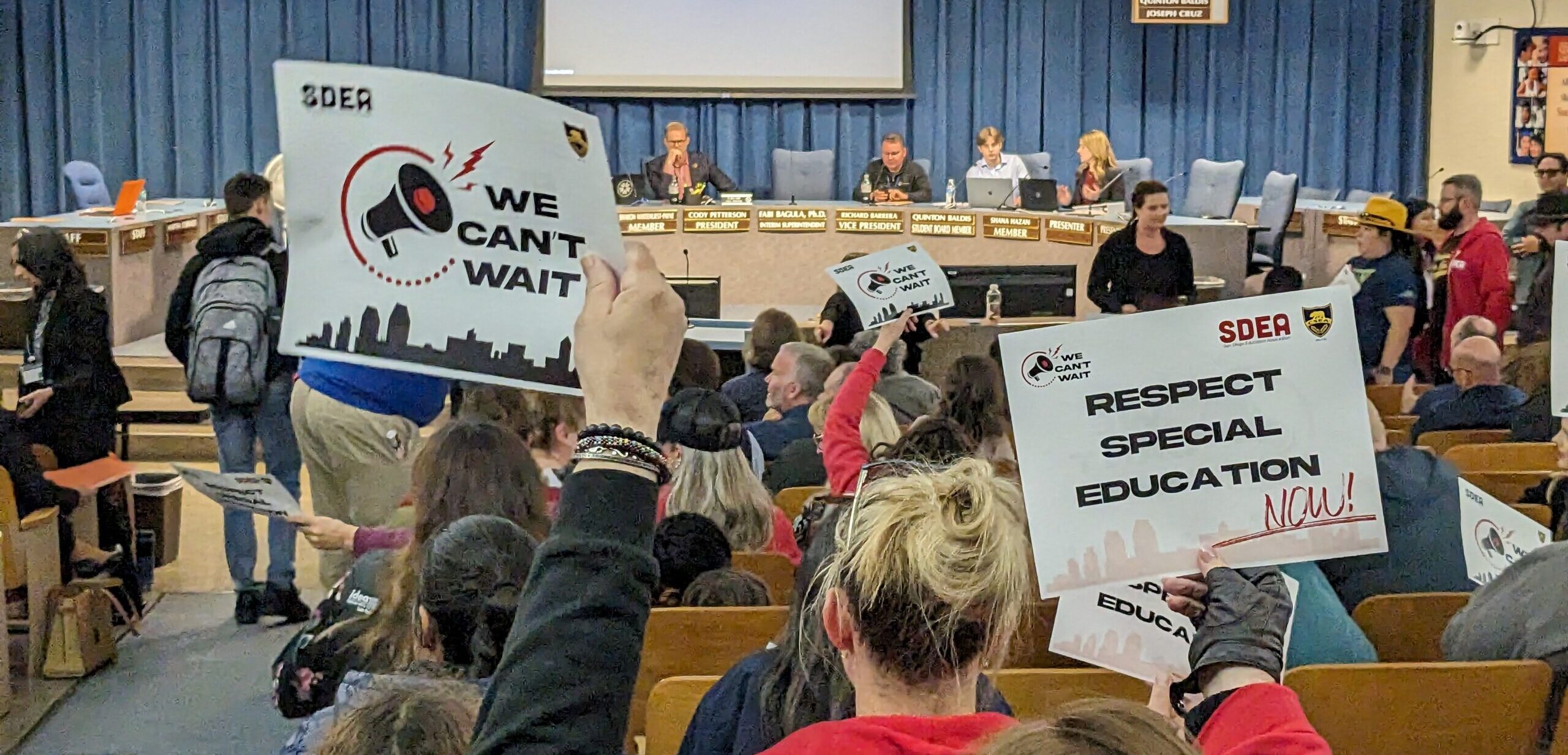
SDEA members will need to make District leadership aware of the student impact of staffing shortages.
Students and educators are the ones impacted by the understaffing of Special Education, and in January SDEA members and classified colleagues showed up to make that clear! In April, we plan to meet with SDUSD Board Members so that they can share the urgency to solve this crisis with Ed Specialists who have been over contractual caseload limits month and month, year after year. Stay tuned for updates, show up at site actions in support of bargaining, and let’s keep the pressure on: Fully Staff Special Education NOW! We Can’t Wait!



